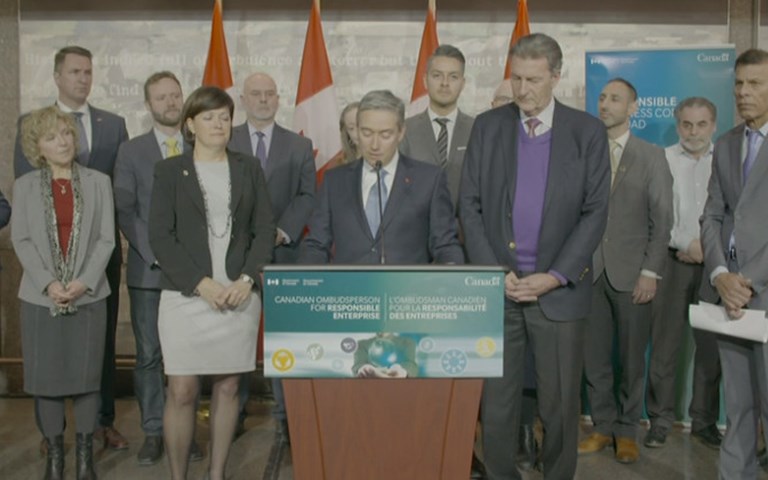The government is creating an independent watchdog to investigate Canadian companies' conduct abroad, and a multi-stakeholder advisory body to work in conjunction with the ombudsperson, International Trade Minister Minister François-Philippe Champagne announced. Screencap courtesy of Global Affairs Canada/Twitter Live
Canada is naming an independent watchdog to investigate alleged human rights abuses linked to Canadian companies’ activities abroad, initially focusing on the mining, oil and gas and garment sectors.
The government is also creating a multi-stakeholder advisory body to work in conjunction with the new Canadian Ombudsperson for Responsible Enterprise (CORE), International Trade Minister François-Philippe Champagne announced Wednesday.
“This is an announcement that’s going to make Canadian companies the international business partner of choice,” Champagne said.
The move was long expected by miners as it was part of the Liberals’ 2015 campaign promise.
The watchdog has a mandate to help resolve disputes between communities and Canadian companies.
The CORE will have the power to investigate allegations, report independently, recommend a remedy and monitor its implementation.
“Through this process, the ombudsperson will offer people a straightforward, credible and fair remedy,” Champagne said.
Remedies suggested could include monetary compensation, corporate policy changes and apologies. The ombudsperson will also have the power to recommend the withdrawal of trade advocacy support and changes to government policy.
“We told Canadians during the election that we would do this. We are now moving forward,” Champagne said, adding that Canada will be the first country in the world to have an ombudsperson for responsible enterprise.
Related: Lawsuit against Nevsun Resources alleging company violated international forced labour norms will go ahead in B.C. court
“We’re very pleased to see that this is being rolled out and will apply across business sectors,” said Ben Chalmers, the Mining Association of Canada’s vice president of sustainable development. “We’ve been working with government and civil society for a while to get to a process that is workable for everyone.”
Chalmers said MAC intends to have a representative on the advisory body.
“We hope to see a diverse table with many informed views from business and civil society come together to constructively and collaboratively work towards better human rights performance,” Chalmers said, adding that protecting human rights is something the association is already active in.
“It’s both a business imperative and the right thing to do. If you’re not operating in a way that is responsible to human rights today, you are not going to be able to operate on a sustainable basis,” Chalmers said.
But he said MAC has expressed concerns about how the ombudsperson’s independent investigation will work in other countries that may not be thrilled about an outsider coming in.
“There are many complications there,” Chalmers said. “Our primary hope is that whatever process it follows will contribute to bringing companies and communities together where disputes exist to jointly resolve the issue in a way that allows them to move forward on a positive basis and improve the relationship.”
Canada already has an extractive sector corporate social responsibility counsellor, Jeffrey Davidson, whose role is to advise companies of their responsibilities and standards as well as reviewing their activities. But Davidson himself has said in the past that the office lacks teeth.
“Speaking my own mind and my own opinion, I believe a hybrid approach is required that allows for preventative authority, as well as regulatory authority and judicial authority,” Davidson told a parliamentary subcommittee on international human rights in September last year.
He said then that an independent ombudsperson would probably carry more power.
“It would mean more dedicated resources, a better implementing architecture for carrying out the mandate that currently exists, and a stronger architecture that provides the ombudsperson or the counsellor with more resources to work with.”



